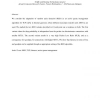Free Online Productivity Tools
i2Speak
i2Symbol
i2OCR
iTex2Img
iWeb2Print
iWeb2Shot
i2Type
iPdf2Split
iPdf2Merge
i2Bopomofo
i2Arabic
i2Style
i2Image
i2PDF
iLatex2Rtf
Sci2ools
102
click to vote
CORR
2000
Springer
2000
Springer
Effect of different packet sizes on RED performance
We consider the adaptation of random early detection (RED) as an active queue management algorithm for TCP traffic in Internet gateways where different maximum transfer units (MTUs) are used. We studied the two RED variants described in [1] and point out a weakness in both. The first variant where the drop probability is independent from the packet size discriminates connections with smaller MTUs. The second variant results in a very high Packet Loss Ratio (PLR), and as a consequence low goodput, for connections with higher MTUs. We show that fairness in terms of loss and goodput can be supplied through an appropriate setting of the RED algorithm.
Related Content
| Added | 17 Dec 2010 |
| Updated | 17 Dec 2010 |
| Type | Journal |
| Year | 2000 |
| Where | CORR |
| Authors | Stefaan De Cnodder, Omar Elloumi, Kenny Pauwels |
Comments (0)

